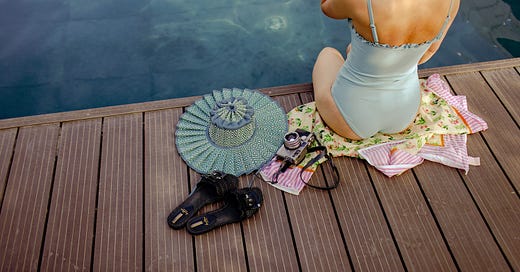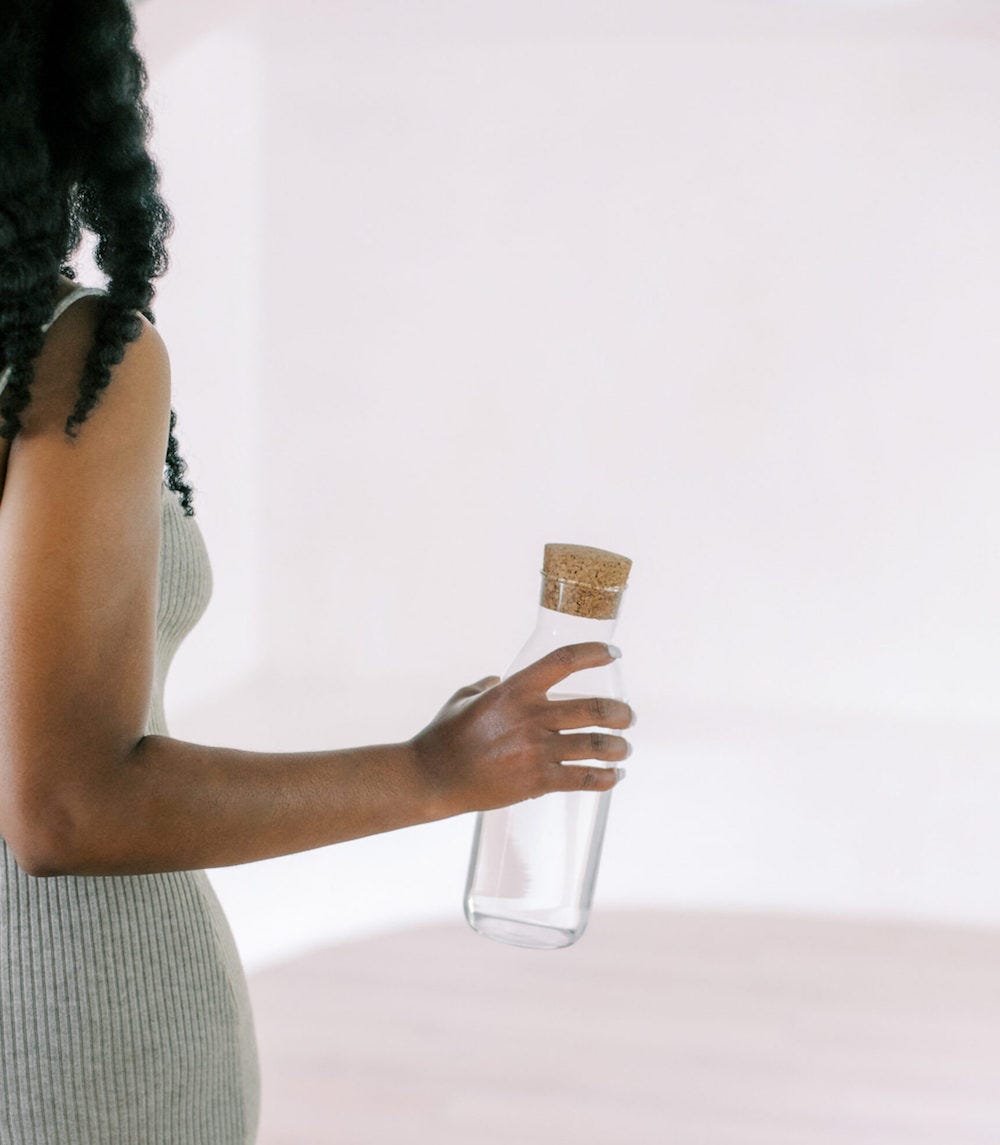Unchartered waters: Women's growing love and need for H20 in midlife
Plus: How your menopause symptoms could really be dehydration • How much water do we really need? • The benefits of swimming in cold water
BeWell | The Midst beauty, style & wellness newsletter
Exclusive for subscribers to The Midst Substack
When I close my eyes and go to my happy place, I always find myself lying on a beach with the saltwater tickling my toes, surrendering to the lullaby of the ocean — splash, the sun warming my bare skin, splash.
I’ve always felt a visceral, significant connection to bodies of water — perhaps because I’m a Pisces, perhaps because I am a body of water.
Why is water such a big deal?
When digging a bit into this phenomenon, to no surprise, I found that scientists have proven what we all know to be true: Gazing at bodies of water (swimming pools included!) can help aid in relaxation and lower our heart rates and blood pressure.
Furthermore, cultures around the world equate water with healing and energy. “Many people believe water can absorb prayers, cleanse unwanted energy, and bestow good medicine,” says Kimberly Miller of the Skokomish Tribe.
Women historically symbolize the element of water due to our traditional roles as life-givers, literal water carriers, and nurturers. For this reason, water is often considered feminine, effortlessly boasting goddess-like maternal, psychological, and even psychic characteristics.
Dive in
Entering this season of renewal — as many of us spring-break to the lands of natural and human-made bodies of water — let’s take a moment to reflect on how this element can impact our minds and bodies.
Of course, if you’re not traveling, you can still see and feel the benefits of water: Simply close your eyes and transport your goddess self to this happy place. Splash.
Water should be a No. 1 priority
We’ve all heard that our bodies are 70% water. But did you know that as we age, that number can drop to 55%? Yikes.
As we enter perimenopause, water intake becomes increasingly important to regulate all of our systems. Plus, some of the unpleasant symptoms that resemble menopause — like brain fog, irritability, and night sweats — can be caused by dehydration.
Since our sensation of thirst strangely declines as we age, and our ability to conserve water also takes a dip, we become much more prone to dehydration, making water intake a No. 1 priority.
9 ways water affects our bodies
1. Brain function
Losing just 2 percent of the water in your body can impair your cognitive performance, attention span, short-term memory, and ability to make decisions. What!
2. Mood
When our brains are thirsty, our moods get funky. By increasing your water intake, you also increase your feelings of calmness, satisfaction, and positive emotions. Who knew?
3. Energy
When you’re low on fluids, you may feel tired and weaker than usual. Replenishing your water intake throughout the day can help to combat fatigue and keep your energy going.
4. Headaches
Even mild dehydration can cause headaches. What stinks is that fatigue, dizziness, and heat cramps can often accompany this. Ouch.
5. Joint pain
If your joints aren’t hydrated, then they’re not properly cushioned. Protect your joints and minimize pain by getting more water.
6. Constipation
Feeling clogged up? It’s likely dehydration. Water keeps food moving through your intestines — and prevents bloat, too.
7. Hot flashes
We know that drinking water can help with hot flashes. But did you know that not drinking water can cause them? Some studies show an increase in hot flashes among women who don’t hydrate. Yet another reason to drink up.
8. Night sweats
Again, we probably reach for water when we wake in sweat. Still, your level of hydration affects the intensity of night sweats, so be sure to stay hydrated throughout the day.
9. Skin
We’ve heard over and over again that water intake hydrates our largest organ, our skin. But does it make us look younger?
“Everyone wants a quick fix when it comes to making skin look better, but drinking more water isn’t going to help get rid of wrinkles or plump up your skin unless you are extremely dehydrated,” says Elizabeth Damstetter, MD, a dermatologist at Rush University Medical Center in Chicago. “But you need water to stay healthy, and if you’re healthy, your skin might not look like it did when you were younger, but it will look pretty good.”
Women should drink 9 cups, or 72 ounces, of water each day.
The benefits of cold-water swimming during menopause
Swimming in cold water could help cool off menopausal symptoms — from stress, hot flashes, and body aches — according to a new study published in Sage Journals.
The study looked at 1,114 women, 785 of whom were going through menopause, all swimming in cold water to see how it impacted them.
The researchers reported that:
Nearly 47% of the women reported improvement in anxiety symptoms.
34% reported improvement in mood swings.
31% found it helped improve mood.
30% found reduced hot flashes.
Most of the women said that a dip in cool water was healing and an immediate stress reliever.
One 57-year-old woman said, “Cold water is phenomenal. It has saved my life. In the water, I can do anything. All symptoms [physical and mental] disappear and I feel like me at my best.”
Keep reading with a 7-day free trial
Subscribe to The Midst to keep reading this post and get 7 days of free access to the full post archives.







